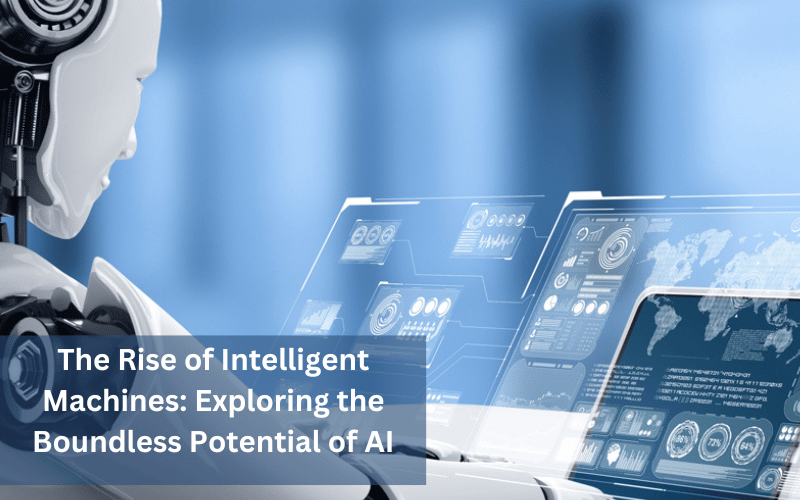
Introduction
The rise of intelligent machines is here to stay. Artificial Intelligence refers to the ability of machines to perform tasks that would normally require human intelligence to complete. This includes things like recognizing patterns, solving problems, learning, and making decisions. The term AI was first coined by computer scientist John McCarthy in 1956. Since then, the field of AI has grown dramatically and has made significant advancements in recent years.
Applications of Artificial Intelligence can be found in many industries, including healthcare, finance, and retail. For example, AI is used in medical imaging to help detect diseases such as cancer and in financial services to prevent fraud. AI is also being used in customer service to provide more personalized experiences for customers.
Types of Artificial Intelligence
Artificial Intelligence can be divided into four categories: Reactive Machines, Limited Memory, Theory of Mind, and Self-Aware.
- Reactive Machines: AI systems that are capable of performing specific tasks in real-time, but they do not have the ability to remember past events. For example, a chess computer that can beat a human opponent is a reactive machine.
- Limited Memory: AI systems have the ability to remember past events, but they can only use this information to make decisions in the present moment. An example of this type of AI is a self-driving car that can remember past events to make decisions in the present moment.
- Theory of Mind: AI systems are capable of understanding human emotions and intentions. This type of AI is still in its early stages of development and is not yet widely used.
- Self-Aware: AI systems are capable of understanding their own consciousness and can make decisions based on that understanding. This type of AI is still purely theoretical and does not yet exist.
Methods of Artificial Intelligence
There are several methods used to develop Artificial Intelligence systems, including Machine Learning, Deep Learning, Natural Language Processing, and Robotics.
- Machine Learning is a method of AI that uses algorithms to learn from data and make predictions. This type of AI is used in many applications, including image recognition and natural language processing.
- Deep Learning is a subset of machine learning that uses artificial neural networks to learn from data. This type of AI is used in applications such as computer vision and speech recognition.
- Natural Language Processing (NLP) is a method of AI that focuses on the ability of machines to understand and interpret human language. NLP is used in applications such as language translation and sentiment analysis.
- Robotics is the application of AI in physical robots. This type of AI is used in applications such as self-driving cars and industrial automation.
Advantages and Disadvantages of Artificial Intelligence
There are several advantages to using Artificial Intelligence, including increased efficiency, better decision-making, and reduced human error. For example, AI can help reduce costs and increase productivity in many industries. AI can also make decisions faster and more accurately than humans, reducing the risk of human error.
However, there are also several disadvantages to using AI. One of the biggest concerns is job loss, as AI can automate many jobs that were previously performed by humans. Additionally, there is a risk of algorithmic bias, as AI systems can make decisions that are influenced by the data they are trained on. Finally, there are security concerns associated with AI, such as the possibility of AI systems being hacked or used for malicious purposes.
Also Read: What is the meaning of AI? Why is it Called ‘Artificial Intelligence’?
Ethical considerations of Artificial Intelligence
As AI becomes increasingly integrated into our lives, it is important to consider the ethical implications of this technology. Some of the key ethical considerations include privacy concerns, the responsibility for AI actions, and algorithmic bias.
Privacy concerns are a major issue with AI, as AI systems can collect and store vast amounts of personal data. This data can be used for malicious purposes or sold to third parties, compromising people’s privacy.
Another ethical concern is the responsibility for AI actions. As AI systems become more autonomous, it becomes increasingly unclear who is responsible for their actions. For example, who is responsible if a self-driving car causes an accident?
Finally, algorithmic bias is a significant concern in AI. AI systems are only as good as the data they are trained on, and if the data is biased, the AI system will also be biased. This can result in decisions that unfairly discriminate against certain groups of people.
Future of Artificial Intelligence
The future of Artificial Intelligence is exciting, with many advancements on the horizon. AI technology is advancing rapidly, and it is becoming increasingly integrated with other technologies such as the Internet of Things (IoT) and blockchain.
In the future, AI has the potential to have a profound impact on society. AI has the potential to solve some of the world’s biggest problems, such as climate change, disease, and poverty. However, it is also important to consider the potential downsides of AI and to ensure that AI is developed and used in a responsible manner.




